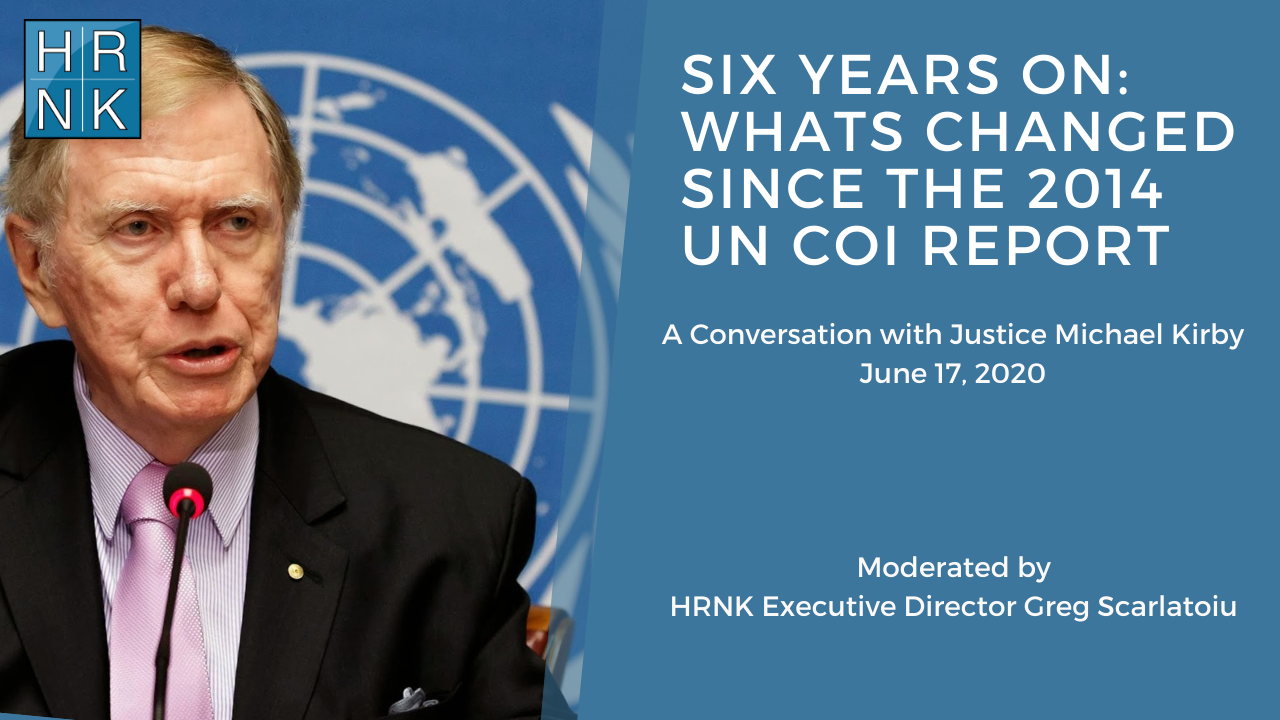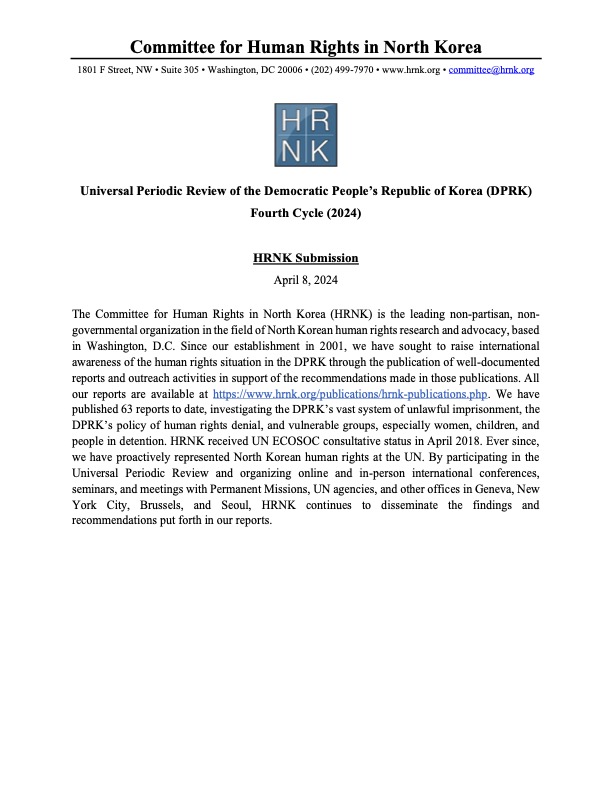 Date and Time:
Date and Time:Description:
The Committee for Human Rights in North Korea (HRNK) cordially invites you to:
Six Years after the UN COI Report:
A Discussion with Justice Michael Kirby
Wednesday, June 17, 2020
7:00 p.m. – 8:00 p.m. Eastern Daylight Time (EDT)
This event will be on the record.
HRNK Executive Director Greg Scarlatoiu will moderate a conversation with The Honorable Michael Kirby, former Chief Commissioner of the UN Commission of Inquiry on human rights in the DPRK. Justice Kirby and Executive Director Scarlatoiu will address the post-UN COI state of human rights in North Korea and measures needed to bring about improvement.
Please send your RSVP to the attention of Rosa Park, HRNK’s Director of Programs, at [email protected]. Once we receive your RSVP, we will send you Zoom credentials.
Biography of The Honorable Michael Kirby
When he retired from the High Court of Australia on 2 February 2009, Michael Kirby was Australia’s longest serving judge.
He was first appointed in 1975 as a Deputy President of the Australian Conciliation & Arbitration Commission. Soon after, he became inaugural Chairman of the Australian Law Reform Commission (1975-84). Later, he was appointed a Judge of the Federal Court of Australia, then President of the New South Wales Court of Appeal (1984-96) and, concurrently, President of the Court of Appeal of Solomon Islands (1995-6). His appointment to the High Court of Australia followed in 1996 and he served thirteen years. In later years, he was Acting Chief Justice of Australia twice.
In addition to his judicial duties, Michael Kirby has served on three university governing bodies being elected Chancellor of Macquarie University in Sydney (1984-93). He also served on many national and international bodies. Amongst the latter have been service as a member of the World Health Organisation’s Global Commission on AIDS (1988-92); as President of the International Commission of Jurists, Geneva (1995-8); as UN Special Representative for Human Rights in Cambodia (1993-6); as a member of the UNESCO International Bioethics Committee (1995-2005); as a member of the High Commissioner for Human Rights’ Judicial Reference Group (2007- 9) and as a member of the UNAIDS Reference Group on HIV and Human Rights(2004-).
Following his judicial retirement, Michael Kirby was elected President of the Institute of Arbitrators & Mediators Australia from 2009-2010. He served as a Board Member of the Australian Centre for International Commercial Arbitration (2009-14). He has been appointed Honorary Visiting Professor by twelve universities. And he participates regularly in many local and international conferences and meetings. He has been awarded a number of honorary doctorates at home and abroad. He also serves as Editor-in-Chief of The Laws of Australia (2009 - ).
He served 2011-12 as a member of the Eminent Persons Group on the future of the Commonwealth of Nations. He was a Commissioner of the UNDP Global Commission of HIV and the Law 2011-2012. He was appointed to the Advisory Council of Transparency International, based in Berlin in 2012. In 2013- 2014, he was appointed Chair of the UN Commission of Inquiry on Human Rights Violations in North Korea. He a Commissioner of the UNAIDS Lancet Commission on AIDS to the Right to Health (2013-2014); the Global Fund’s Equitable Access Panel (2015-16); the UN Secretary-General’s High Level Panel on Access to Essential Medicines (2015-16); and UNAIDS/OHCHR’s panel on overreach of criminal law (2017); and Co-Chair of the International Bar Association’s Human Rights Institute (2018 - ).
He was awarded the Gruber Justice Prize in 2010 and has been Patron of the Kirby Institute on Blood Borne Diseases in UNSW Sydney, Australia since 2011. In May 2017, he was invested by Japan with the insignia of the Order of the Rising Sun, Gold and Silver Star in Tokyo, with an audience with the Emperor of Japan.
In this submission, HRNK focuses its attention on the following issues in the DPRK:
- The status of the system of detention facilities, where a multitude of human rights violations are ongoing.
- The post-COVID human security and human rights status of North Korean women, with particular attention to sexual and gender-based violence (SGBV).
- The issue of Japanese abductees and South Korean prisoners of war (POWs), abductees, and unjust detainees.
This report provides an abbreviated update to our previous reports on a long-term political prison commonly identified by former prisoners and researchers as Kwan-li-so No. 25 by providing details of activity observed during 2021–2023.
This report was originally published on Tearline at https://www.tearline.mil/public_page/prison-camp-25.
This report explains how the Kim regime organizes and implements its policy of human rights denial using the Propaganda and Agitation Department (PAD) to preserve and strengthen its monolithic system of control. The report also provides detailed background on the history of the PAD, as well as a human terrain map that details present and past PAD leadership.

HRNK's latest satellite imagery report analyzes a 5.2 km-long switchback road, visible in commercial satellite imagery, that runs from Testing Tunnel No. 1 at North Korea's Punggye-ri nuclear test facility to the perimeter of Kwan-li-so (political prison camp) no. 16.
This report proposes a long-term, multilateral legal strategy, using existing United Nations resolutions and conventions, and U.S. statutes that are either codified or proposed in appended model legislation, to find, freeze, forfeit, and deposit the proceeds of the North Korean government's kleptocracy into international escrow. These funds would be available for limited, case-by-case disbursements to provide food and medical care for poor North Koreans, and--contingent upon Pyongyang's progress
For thirty years, U.S. North Korea policy have sacrificed human rights for the sake of addressing nuclear weapons. Both the North Korean nuclear and missile programs have thrived. Sidelining human rights to appease the North Korean regime is not the answer, but a fundamental flaw in U.S. policy.
(Published by the National Institute for Public Policy)

North Korea’s forced labor enterprise and its state sponsorship of human trafficking certainly continued until the onset of the COVID pandemic. HRNK has endeavored to determine if North Korean entities responsible for exporting workers to China and Russia continued their activities under COVID as well.
George Hutchinson's The Suryong, the Soldier, and Information in the KPA is the second of three building blocks of a multi-year HRNK project to examine North Korea's information environment. Hutchinson's thoroughly researched and sourced report addresses the circulation of information within the Korean People's Army (KPA). Understanding how KPA soldiers receive their information is needed to prepare information campaigns while taking into account all possible contingenc
This report is part of a comprehensive long-term project undertaken by HRNK to use satellite imagery and former prisoner interviews to shed light on human suffering in North Korea by monitoring activity at political prison facilities throughout the nation. This is the second HRNK satellite imagery report detailing activity observed during 2015 to 2021 at a prison facility commonly identified by former prisoners and researchers as “Kwan-li-so No. 14 Kaech’ŏn” (39.646810, 126.117058) and
This report is part of a comprehensive long-term project undertaken by HRNK to use satellite imagery and former prisoner interviews to shed light on human suffering in North Korea by monitoring activity at civil and political prison facilities throughout the nation. This study details activity observed during 1968–1977 and 2002–2021 at a prison facility commonly identified by former prisoners and researchers as "Kyo-hwa-so No. 3, T'osŏng-ni" and endeavors to e
This report is part of a comprehensive long-term project undertaken by HRNK to use satellite imagery and former detainee interviews to shed light on human suffering in the Democratic People’s Republic of Korea (DPRK, more commonly known as North Korea) by monitoring activity at political prison facilities throughout the nation. This report provides an abbreviated update to our previous reports on a long-term political prison commonly identified by former prisoners and researchers as Kwan-li-so<
Through satellite imagery analysis and witness testimony, HRNK has identified a previously unknown potential kyo-hwa-so long-term prison-labor facility at Sŏnhwa-dong (선화동) P’ihyŏn-gun, P’yŏngan-bukto, North Korea. While this facility appears to be operational and well maintained, further imagery analysis and witness testimony collection will be necessary in order to irrefutably confirm that Sŏnhwa-dong is a kyo-hwa-so.

"North Korea’s Long-term Prison-Labor Facility Kyo-hwa-so No. 8, Sŭngho-ri (승호리) - Update" is the latest report under a long-term project employing satellite imagery analysis and former political prisoner testimony to shed light on human suffering in North Korea's prison camps.

Human Rights in the Democratic Republic of Korea: The Role of the United Nations" is HRNK's 50th report in our 20-year history. This is even more meaningful as David Hawk's "Hidden Gulag" (2003) was the first report published by HRNK. In his latest report, Hawk details efforts by many UN member states and by the UN’s committees, projects and procedures to promote and protect human rights in the DPRK. The report highlights North Korea’s shifts in its approach
South Africa’s Apartheid and North Korea’s Songbun: Parallels in Crimes against Humanity by Robert Collins underlines similarities between two systematically, deliberately, and thoroughly discriminatory repressive systems. This project began with expert testimony Collins submitted as part of a joint investigation and documentation project scrutinizing human rights violations committed at North Korea’s short-term detention facilities, conducted by the Committee for Human Rights










